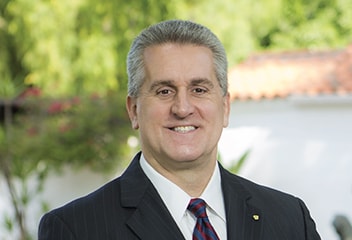
“According to religious statistics, old Europe is still a part of the earth that is almost completely Christian. But there is hardly another case in which everyone knows as well as they do here that the statistic is false: This so-called Christian Europe for almost four hundred years has become the birthplace of a new paganism, which is growing steadily in the heart of the Church, and threatens to undermine her from within. The outward shape of the modern Church is determined essentially by the fact that, in a totally new way, she has become the Church of pagans, and is constantly becoming even more so. She is no longer, as she once was, a Church composed of pagans who have become Christians, but a Church of pagans, who still call themselves Christians, but actually have become pagans. Paganism resides today in the Church herself, and precisely that is the characteristic of the Church of our day, and that of the new paganism, so that it is a matter of a paganism in the Church, and of a Church in whose heart paganism is living.
Therefore, in this connection, one should not speak about the paganism, which in eastern atheism has already become a strong enemy against the Church, and as a new anti-christian power opposes the community of believers. Yet, when concerning this movement, one should not forget that it has its peculiarity in the fact that it is a new paganism, and therefore, a paganism that was born in the Church, and has borrowed from her the essential elements that definitely determine its outward form and its power. One should speak rather about the much more characteristic phenomenon of our time, which determines the real attack against the Christian, from the paganism within the Church herself, from the “desolating sacrilege set up where it ought not to be” (Mk 13:14).
The fact that today, even given an optimistic evaluation, certainly more than half of the Catholics (here we are considering only our Church) no longer “practice” their faith, should not be explained clearly in the sense that this large number of non-practicing Catholics should simply be called pagans. It is still evident that they no longer simply embrace the faith of the Church, but that they make a very subjective choice from the creed of the Church in order to shape their own world view. And there can be no doubt that most of them, from the Christian point of view, should really no longer be called believers, but that they follow, more or less, a secular philosophy.
They do indeed affirm the moral responsibility of man, but it is based on, and limited by, purely rational considerations. The ethics of N. Hartmanns, K. Jaspers, and M. Heidegger, for example, defend the more or less known convictions of many morally upright men, but they are in no sense Christians. The well-known little book published by the List-Verlag (a German publishing house — Editor’s note) entitled, What Do You Think About Christianity? can open the eyes of anyone, who has allowed himself to be deceived by the Christian façade of our contemporary public image, to the realization of how far and wide such purely rational and irreligious morality has spread. Therefore, the modern man today, when he meets someone else anywhere, can assume with some certainty that he has a baptismal certificate, but not that he has a Christian frame of mind. Therefore, he must presume as the normal state of affairs the lack of faith of his neighbor. This fact has two important consequences: On the one hand, it includes a fundamental change in the structure of the Church; and, on the other hand, it has produced an essential change of consciousness on the side of the still-believing Christians. These two phenomena will be clarified in greater detail in this lecture.
When the Church had her beginning, it rested on the spiritual decision of the individual person to believe, on the act of conversion. If one at the beginning had hoped that a community of saints would be built here on earth out of the converts, “a Church without spot or wrinkle,” then in the midst of difficulties, one must come more and more to the realization that also the convert, the Christian, remains a sinner, and that even the greatest sins could possibly take place in the Christian community. In four hundred years of conflict with “heretics” [Cathari!] the Church has had abundant knowledge about this. But if, accordingly, the Christian was not a morally perfect person, and in this sense the community of the saints always remained imperfect, still there was a fundamental agreement according to which Christians were distinguished from non-Christians, namely, faith in the grace of God which was revealed in Christ.
The Church was a community of believers, of men who had adopted a definite spiritual choice, and because of that, they distinguished themselves from all those who refused to make this choice. In the common possession of this decision, and its conviction, the true and living community of the faithful was founded, and also its certainty; and because of this, as the community of those in the state of grace, they knew that they were separated from those who closed themselves off from grace. Already in the Middle Ages, this was changed by the fact that the Church and the world were identical, and so to be a Christian fundamentally no longer meant that a person made his own decision about the faith, but it was already a political-cultural presupposition. A man contented himself with the thought that God had chosen this part of the world for himself; the Christian’s self-consciousness was at the same time a political-cultural awareness of being among the elect: God had chosen this Western world. Today, this outward identity of Church and world has remained; but the conviction that in this, that is, in the unchosen belonging to the Church, also that a certain divine favor, a heavenly redemption lies hidden, has disappeared.
The Church is like the world, a datum of our specifically Western existence, and indeed, like the definite world to which we belong, a very contingent reality. Almost no one believes seriously that eternal salvation can depend on this very contingent, cultural and political reality that we call the “Church.” For the Westerner, the Church is, for the most part, nothing more than a very accidental part of the world; through her externally remaining identity with the world, she has lost the seriousness of her claim. So it is understandable that, today, often the question will be asked very urgently whether or not the Church should again be turned into a community of conviction, in order to confer on her again her great gravity. That would mean that she rigidly abandons the still present worldly positions, in order to get rid of an apparent possession, which shows itself to be more and more dangerous, because it stands in the way of the truth.
For some time now, this question has been eagerly discussed especially in France, where the decline of a Christian conviction has progressed more than it has among us, and so the contrast between appearance and reality is felt to be much stronger. But naturally the problem is the same among us. There, the supporters of a more strict direction stand in opposition to those of a more accommodating position. The former emphasize the necessity of, once again, giving their full weight to the Sacraments, “unless one wants to fall further into the de-Christianization of Europe. It is no longer possible to continue to give the Sacraments to the persons who want to receive them only on the basis of social convention, and thoughtless tradition, and for whom the Sacraments are only empty rituals.”
Opposed to that, the supporters of a more accommodating position emphasize that one should not extinguish the glowing wick, that the request for the Sacraments [e.g., Matrimony, Baptism, Confirmation or First Communion; Burial of the Dead!] manifests even now a certain connection with the Church; one should not refuse these things to anyone, unless one wants to risk a damage that would be very hard to repair. The supporters of the strict direction show themselves here as attorneys for the community, while those of the accommodating approach come forth as advocates for the individual: they claim that the individual has a right to the Sacraments. In contrast, the supporters of the strict direction raise this objection: “If we want to bring the country back to Christianity, then it will happen only through the witness of small, zealous communities. In many places, it is probably necessary to begin all over again. Is it bad if a few individuals are rejected, but the future will be saved? Are we not a missionary country? Accordingly, why do we not use missionary methods? Now these require, first of all, strong communities, who then show themselves capable of receiving individual members.”
Finally, this discussion became so vehement that the French episcopate saw that it was necessary to intervene. So on April 3, 1951, they published a “Directory for the Administration of the Sacraments,” that in general takes a middle position. For example, with regard to Baptism, it determines that fundamentally it should be conferred on the children of non-practicing parents, if they ask for it. So it is not right simply to consider the parents to be apostates; their request for Baptism allows one at least to assume that they still have a certain kernel of religious conviction. “If, however, the prior children have not been raised in a Christian way, one can only confer Baptism, if the obligation is accepted at the proper time to send the child to be baptized to the catechism classes, and also the older children, inasmuch as this is possible.”
Some dioceses require a written commitment, and there is a special form for this. The Directory then says in particular: “Nuns, and members of Catholic Action, should be notified that they should not, in order to confer such Baptisms in all circumstances, exercise excessive pressure, which could give the impression of a lack of propriety.” This one example of Baptism shows that the Directory, in general, takes a very compassionate, or rather, a mild approach. Especially, it refuses to declare that non-practicing Catholics are simply apostates, and that means in praxis: they are not considered to be pagans, and they prefer, on the contrary, to pass judgment on each individual case.
However, this approach is not essentially different from what is still commonly done in our country. The Directory puts in the place of a pure sacramentalism, once again, an attitude of faith. Among us, one still encounters — and not only among nuns — the attitude that it would be a good thing if someone with finesse and cunning brings it about that the water of Baptism can be poured over a child. One cannot rest until the identity of “Church” and “world” is complete. In doing this, a person not only gives away the Sacraments, but he also cheapens them, and makes them worthless.
The Directory expresses very clearly that the situation is completely different: Certainly in the Sacraments, God offers His salvation to all mankind; certainly He invites all generously to come to His banquet, and the Church has the task of handing on this invitation, this open gesture of offering a place at God’s table; but the fact still remains that God does not need man, but man needs God. Men are not doing a favor for the Church, or the pastor, when they still receive the Sacraments, but the Sacrament is the favor which God confers on men. Therefore, it is not a matter of making the Sacraments difficult or easy to receive, but it has to do with having the conviction according to which a man knows and receives the grace of the Sacraments as a grace. This primacy of conviction, of faith in place of mere sacramentalism, is the very important teaching that stands behind the reasonable and prudent determinations of the French Directory. In the long run, the Church cannot avoid the need to get rid of, part by part, the appearance of her identity with the world, and once again to become what she is: the community of the faithful.
Actually, her missionary power can only increase through such external losses. Only when she ceases to be a cheap, foregone conclusion, only when she begins again to show herself as she really is, will she be able to reach the ear of the new pagans with her good news, since until now they have been subject to the illusion that they were not real pagans. Certainly such a withdrawal of external positions will involve a loss of valuable advantages, which doubtless exist because of the contemporary entanglement of the Church with civil society. This has to do with a process which is going to take place either with, or without, the approval of the Church, and concerning which she must take a stand {the attempt to preserve the Middle Ages is foolish and would be not only tactically, but also factually, wrong}. Certainly, on the other hand, this process should not be forced in an improper manner, but it will be very important to maintain that spirit of prudent moderation that is found in an ideal way in the French Directory.
All in all, in this necessary process of the de-secularization of the Church, one must keep three levels fully separated: the level of the sacramental, the level of the proclamation of the faith, and the level of the personal, human relationship between the faithful and the non-faithful. On the sacramental level, which formerly was protected by the arcana, or rule, of secrecy, is the truly inner essence of the Church. It must be freed from a certain simple confusion with the world, which gives either the impression of something magical, or reduces the sacraments to the level of being mere ceremonies {Baptism, First Communion, Confirmation, Matrimony, Burial}. It must, once again, become clear that Sacraments without faith are meaningless, and the Church here will have to abandon gradually and with great care, a type of activity, which ultimately includes a form of self-deception, and deception of others. In this matter, the more the Church brings about a self-limitation, the distinction of what is really Christian and, if necessary, becomes a small flock, to this extent will she be able, in a realistic way, to reach the second level, that is, to see clearly that her duty is the proclamation of the Gospel.
If the Sacrament is the place where the Church distinguishes itself, and must distinguish itself from the non-church, then the word is the method and way with which she carries on the open invitation to the divine banquet. Still, here one should not forget that there are two kinds of preaching: the ordinary preaching, which is a part of the Sunday liturgy, and the missionary preaching, which can be accomplished in a course of fasting and missionary sermons. The ordinary preaching, or the word proclaimed in the liturgy, can and should be relatively short, because it should not really announce new things, because its purpose is to dig deeper into the mystery of the faith, which has already, fundamentally, been accepted and affirmed. Missionary preaching should not deal with mere attitudes and individual points, but much more fundamentally present an outline of the faith, or the essential parts of it, in a way that the modern man can understand it. But here the matter to be covered cannot be spread out as far as it should be; to the extent that people cannot be reached through the word in this way, pastoral letters and public information can and should be used as much as possible.
Given these considerations, there should never be an attempt to administer a sacrament over a radio program, but it is suitable for missionary preaching. On the level of personal relations, finally, it would be very wrong, out of the self-limitation of the Church, which is required for her sacramental activity, to want to derive a sequestering of the faithful Christian over against his unbelieving fellow men. Naturally, among the faithful gradually something like the brotherhood of communicants should once again be established who, because of their common participation in the Lord’s Table in their private life, feel and know that they are bound together. This is so that in times of need, they can count on each other, and they know they really are a family community. This family community, which the Protestants have, and which attracts many people to them, can and should be sought, more and more, among the true receivers of the Sacraments.
This should have no sectarian seclusion as its result, but the Catholic should be able to be a happy man among men — a fellow man where he cannot be a fellow Christian. And I mean that in his relations with his unbelieving neighbors, he must, above all, be a human being; therefore, he should not irritate them with constant preaching and attempts to convert them. In a friendly way, he will be offering him a missionary service by giving him a religious article, when he is sick to suggest the possibility of calling a priest, or even to bring a priest to see him. He should not be just a preacher, but also in a friendly and simple way, a fellow human being who cares for others. (emphasis Ed.)
In a summary fashion as the result of this first series of thoughts, we have established this point: The Church, first of all, has undergone a structural change from a small flock to a world Church, and since the Middle Ages in the West, she has more or less been identified with the world. Today, this identity is only an appearance, which hides the true essence of the Church and the world, and to some extent hinders the Church in her necessary missionary activity. And so, either sooner or later, with or contrary to the will of the Church, according to the inner structural change, she will become externally a little flock. The Church must take into account this fact — that in the administration of the Sacraments, she proceeds more cautiously, that in her preaching, she makes a distinction between missionary preaching, and preaching to the faithful. The individual Christian will strive more earnestly for a brotherhood of Christians, and, at the same time, try to show his fellow humanity, with unbelieving fellow men around him, in a truly human and deeply Christian way.
Next to this sketchy structural change of the Church, it is also necessary to note a change of consciousness among the faithful, which is a result of the fact of the increasing paganism within the Church. For the modern Christian, it has become unthinkable that Christianity, and in particular the Catholic Church, should be the only way of salvation; therefore, the absoluteness of the Church, and with that, also the strict seriousness of her missionary claim, and, in fact, all of her demands, have become really questionable. Ignatius of Loyola requires the one making the spiritual exercises, in the meditation on the Incarnation, consider how the Trinitarian God sees that all men are falling into hell. Francis Xavier could tell the believing Mohammedans that all their piety was useless because they, whether pious or godless, whether criminals or virtuous persons, in any event were going to hell, because they did not belong to the only Church that makes a person pleasing to God. (empahsis Ed.)
Today, our humanity prevents us from holding such views. We cannot believe that the man next to us, who is an upright, charitable, and good man, will end up going to hell because he is not a practicing Catholic. The idea that all “good” men will be saved today, for the normal Christian, is just as self-evident as formerly was the conviction of the opposite. Indeed, since Bellarmine, who was one of the first to give consideration to this humanitarian desire, the theologians in many different ways have striven to explain how this saving of all “upright” persons ultimately is a salvation through the Church, but these constructions were somewhat too ingenious for them to make, and leave behind much of an impression. Practically, the admission remained that “good men” “go to heaven,” therefore, that one can be saved by morality alone; surely, this applies first of all, and is conceded to the unbelievers, while the faithful are constantly burdened with the strict system of Church requirements. (emphasis Ed.)
So being somewhat confused by this, the believer asks himself: Why can those outside the Church have it so easy, when it is made so difficult for us? He begins to think and to feel that the faith is a burden, and not a grace. In any event, he still has the impression that, ultimately, there are two ways to be saved: through the merely subjectively measured morality for those outside the Church, and for Church members. And he cannot have the feeling that he has inherited the better part; in any event, his faithfulness is grievously burdened by the establishment of a way to salvation alongside that of the Church. It is obvious that the missionary zeal of the Church has suffered grievously under this internal uncertainty.
I am trying, as an answer to this difficult question which troubles many Christians today, to point out in very short observations that there is only one way to salvation — namely, the way through Christ. But this rests primarily on the cooperation of two mutually opposed powers, on two, as it were, balance scales that together are only one scale, so that each balance scale, by itself alone, would be completely meaningless, and only has meaning as a part of the one scale of God. Indeed, this begins with the fact that God separated the people of Israel from all the other peoples of the world as the people of His choice. Should that then mean that only Israel has been chosen, and that all the other peoples have been rejected? At first it seems to appear as if this contrast of the chosen people, and the non-chosen peoples, should be considered in this static sense: as the placing next to each other of two different groups. But very soon, it becomes evident that that is not the case; for in Christ, the static placing next to each other of Jews and pagans becomes dynamic, so that now the pagans through their “not having been chosen” are changed into the chosen, but this does not mean that the choice of Israel was basically illusory, as is proved by Romans 11.
So one sees that God can choose men in two ways: directly, or through their apparent rejection. To state it more clearly: one sees clearly that God divides mankind into the “few” and the “many” — a division that occurs in the Scriptures, again and again: “The gate is narrow and the way is hard, that leads to life, and those who find it are few” (Matt. 7:14); “The laborers are few” (Matt. 9:37); “Few are chosen” (Matt. 22:14); “Fear not, little flock” (Luke 12:32); Jesus gave His life as a ransom for the “many” (Mark 10:45). The opposition of Jews and pagans, of Church and non-Church, repeats this division into the few and the many. But God does not divide into the few and the many with the purpose of condemning the latter, and saving the former; also, He does not do it in order to save the many easily, and the few in a difficult way, but He makes use of the few like an Archimedean point by which He lifts the many out of their difficult situation, like a lever with which He draws them to Himself. Both have their role in salvation, which is different, but still there is only one way to achieve salvation.
One can only then understand this opposition correctly, when he comes to see that for him, the opposition of Christ and mankind lies at the root of the one and the many. That is, one sees here now very clearly the opposition: The fact is that all mankind deserves condemnation, and only the One deserves salvation. Here, something very important is visible, which is often overlooked, even though it is most decisive: the gracious nature of salvation, the fact that it is an absolutely free gift of grace; for the salvation of man consists in the fact that he is loved by God, that his life at its end finds itself in the arms of eternal love. Without that, everything would remain empty for him. Eternity without love is hell, even if otherwise nothing else happens. The salvation of man consists in being loved by God. But there is no legal claim to love. This is so even on the basis of moral goodness. Love is essentially a free act, or it is not really love. For the most part, we tend to overlook this with all moralism. Actually, no morality of the highest kind can transform the free response of love into a legal claim. Thus, salvation always remains a free grace, even apart from the reality of sin; for even the highest morality is still that of a sinner. (emphasis Ed.) No one can honestly deny that even the best moral decisions of men, still in one way or another, even if it is subtly hidden, are infected with a certain amount of self-seeking. Q1. So this point remains true: In the opposition between Christ, the One, and us, the many, we are unworthy of salvation, whether we are Christians or non-Christians, faithful or unbelievers, moral or immoral. No one besides Christ really “deserves” salvation. Q2.
But even here, there occurs a wonderful exchange. Condemnation belongs to all men together, but salvation belongs to Christ alone. But in a holy exchange, the opposite takes place: He alone takes all the evil upon himself, and in this way, he makes the place of salvation free for all of us. All salvation, which can be given to men, is based on this fundamental exchange between Christ, the One, and us, the many, and it is up to the humility of faith to acknowledge this. But here, one must add the fact that according to God’s will, this fundamental exchange, this great mystery of substitution, on which all of history depends, continues itself in a complete system of representation, which has its coronation in the opposition of Church and non-Church, of the faithful and the “pagans.” This opposition of Church and non-Church does not mean a state of being next to each other, nor being opposed to each other, but of being for each other, in which both sides retain their own necessity, and their own proper function. In the continuation of the mission of Christ, the representation of the many has been committed to the few, who are the Church, and the salvation of both takes place only in their functional coordination, and their common subordination, under the great representation of Jesus Christ, which includes both groups. But if mankind in this representation by Christ, and in its continuation through the dialectic of the “few” and the “many” will be saved, then this means also that each person, above all the faithful, have their inevitable function in the whole process of the salvation of mankind. Q3.
If men and women, indeed the greater number of persons are saved, without belonging in the full sense to the community of the faithful, so then it takes place only because the Church herself exists as the dynamic and missionary reality, because those who have been called to belong to the Church are performing their duty as the few. That means that there is the seriousness of true responsibility, and the danger of real rejection, of really being lost. Although we know that individual persons, and indeed many, are saved outwardly without the Church (yes) Q4, still we also know that the salvation of all always depends on the continuation of the opposition between the few and the many; that there is a vocation of man, concerning which he can become guilty, and that this is a guilt because of which he can be lost (and, no).
No one has the right to say: “See, others are saved without the full weight of the Catholic faith, so why not I also?” Q5. How then do you know that the full Catholic faith is not meant necessarily for you — a faith that God requires of you for reasons about which you should not try to bargain, because they belong to the things about which Jesus says: “You cannot understand them now, but you will later on” (John 13:36). Q6. So it remains true looking at modern pagans that Christ must know that their salvation lies hidden in the grace of God, on which, of course, his (the pagan’s) salvation depends, that in a look at their possible salvation he cannot dispense Himself from the seriousness of their own act of faith, and that this lack of faith must be for the pagan a strong incentive for a more complete faith, because he knows that he has been included in the representative function of Jesus Christ, on which the salvation of the world, and not just that of Christians, depends. Q7.
In conclusion, I must clarify these ideas somewhat by a brief exegesis of two texts of Scripture, in which a point of view regarding this problem will be made known. There is, first of all, the difficult and weighty text, in which the opposition of the many and the few is expressed in an especially forceful way: “Many are called, but few are chosen” (Mt 22:14). What does this text mean? Surely it does not say that many are condemned Q8, as one commonly tends to interpret it, but first of all that there are two forms of divine election. To put it still more precisely: It says clearly that there are two different divine acts, both of which have to do with election, without now giving us clarity whether or not both obtain their end.
But if one considers the course of salvation history, as the New Testament expresses it, then one finds this word of the Lord illustrated: From the static neighborliness of the chosen people, and the not-chosen people, there was in Christ a dynamic relationship, so that the pagans through not being chosen became the chosen ones, and then, of course, through the choice of the pagans, the Jews return back to their election. So this word can be an important teaching instrument for us. The question about the salvation of men is always falsely stated if it is posed from below, that is, as a question about how men justify themselves. The question about the salvation of men is not a question of self-justification, but one of justification through the free grace of God. It is necessary to see these things from above. There are not two ways in which men justify themselves, but two ways in which God chooses them, and these two ways of election by God are the one way of salvation of God in Christ and his Church; and this relies on the necessary dialectic of the few, and the many, and on the representative service of the few in the prolongation of Christ’s representation, or substitution.
The second text is that of the great banquet (Lk 14:16-24). This gospel is, above all, in a radical way the Good News, when it recounts that at the end, heaven will be filled with all those that one can, in one way or another, include; with people who are completely unworthy, who with regard to heaven are blind, deaf, lame, and beggars. Therefore, this is a radical act of grace, and who would wish to deny that perhaps all our modern, European pagans in this way can enter into heaven?
On the basis of this position, everyone has hope. On the other hand: The gravity of the situation remains. There is a group of those who will always be rejected. Who knows whether among these rejected Pharisees there is not perhaps someone who believed, who must be considered to be among good Catholics, but in reality was a Pharisee? On the other hand, who really knows whether among those, who do not accept the invitation, precisely those Europeans are to be found, to whom Christianity was offered, but who have rejected it? So at the same time, there remains for all both hope and a threat. In this intersection of hope and threat Q9, out of which the gravity and the great joy of being a Christian manifests itself, the contemporary Christian lives his life for the most part in the midst of the new pagans, which he, in another way, knows are placed in the same situation of hope and threat, because also for them, there is no other salvation than the One in which he believes: Jesus Christ, the Lord.”
https://www.catholiceducation.org/en/religion-and-philosophy/catholic-faith/the-new-pagans-and-the-church.html
Q1. Is the non-self seeking heroic virtue? If so, heroic virtue would not be heroic. It would be common place. So, I believe there is an every day, common middle of reasonable preservation without becoming entitled.
Q2. Jesus is God. Does God need salvation?
Q3. ?
Q4. So, there is no real need, at least on an individual level for the Church? Let the other guy bear the burden?
Q5. Why? Given what you just said?
Q6. So, free will has no place?
Q7. What about when the clock stops, which is implied in Extra ecclesiam nulla salus, etc.?
Q8. Saints on Salvation.
Q9. Methinks the good reverend is saying to the CINOs (Catholics in name only) of Europe, (or anywhere for that matter) don’t be so assured of your salvation due to your CINO status. Sinners and tax collectors are entering the Kingdom of God before you. He is, in a sense, scolding CINOs. Imho, I think there are quicker ways for the good reverend to make his point more quickly based on Scripture. Mt 20:1-16 and 21:31, come to mind.
Love & faith,
Matthew

















